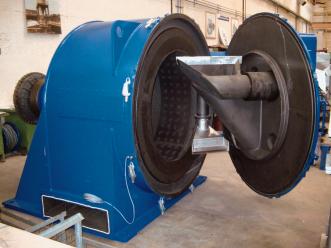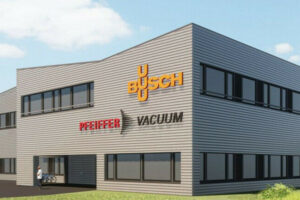On July 1st 2003 the new Atex directives became binding for equipment used in potentially explosive atmospheres. These new regulations aim to provide a uniform basis for legal requirements in the individual member states of the EU. This, however, has far-reaching consequences for the EU’s second-hand machine market.
In contrast with previous specifications the Atex directives also apply to non-electrical components that can cause heat or sparking through mechanical friction. Centrifuges, with their fast-rotating and moving parts, thus also fall within the scope of the new directives. When new machines are developed, these regulations are taken into consideration, Ex assessments are carried out and necessary design measures are adopted. It goes without saying that the resulting designs comply with the new regulations. The situation in the second-hand machine sector is quite different, however. Since none of the second-hand machines available on the market today were designed or built to comply with Atex, considerable expenditure is frequently unavoidable if these machines are to be reintroduced to the market within the EU (or Switzerland). The sole exception in this respect are machines that have already been operated in potentially explosive atmospheres. Even this exception only applies if the machines are used – unmodified – in a hazardous area with an identical explosion protection class to the former area of use. Sub-assemblies of machines which have been modified or replaced with non-identical components always have to comply with the new directives. In the case of a centrifuge, this affects a large number of components and assemblies as well as the entire electrical equipment, such as motors, valves and proximity switches.
Is conversion still worthwhile?
Conversion consequently involves additional costs owing to the need for new parts and, in particular, to the substantial changes to the design and documentation. Although these costs are partly passed on to the customer, they considerably reduce the supplier’s profit margin. The comparatively favourable purchase price – one of the most common reasons behind the decision to buy a second-hand machine – becomes less significant and less attractive. A completely overhauled and reconditioned machine can of course still be delivered quicker and more cheaply than an equivalent new machine. Nevertheless, the reduced difference in price means that potential buyers are more inclined to decide in favour of new equipment.
This trend will undoubtedly hit dealers trading solely in second-hand machines harder than original equipment manufacturers who also offer overhauled machines in addition to selling new ones. Another aspect that is predicted to create problems for second-hand dealers is that only a very few of them avail of the necessary infrastructure to convert machinery such that it complies with the new directives.
They lack not only essential documentation to facilitate properly implemented design changes to the numerous assemblies but also suitably experienced and qualified personnel. These persons must be able to carry out the Ex assessment required for compliance with the Atex directives efficiently and correctly, and to draft design modifications according to the identified hazards. The only option open to someone who simply sells second-hand machines is to have this work done externally. The ensuing costs are so high that the dealer will no longer be able to offer these machines at a reasonable price.
Bad news is good news
The factors that make the going tough for second-hand dealers translate into advantages, however, for original equipment manufacturers who sell their own second-hand machines. A full set of documentation on each machine forms the basis for comprehensive testing and an accurate specification of the required modifications. Second-hand machines also benefit from features actually developed for new machines, helping to reduce the amount of design work that goes into conversion measures. As OEMs are able to specialise in their own products, the essential modifications will start to be repeated after a while, so that in the long term the design phase will be shorter and the costs correspondingly lower.
Existing resources such as part manufacturing equipment and experienced assembly teams allow modifications aimed at harmonising second-hand machines with Atex to be completed quickly and efficiently. The implications of these advantages are easy to see. In the medium term, second-hand machine dealers in the EU will lose market shares, because it will be impossible for them to offer machines that comply with the Atex directives at a competitive price. Customers wishing to make a purchase will, therefore, in most cases be faced with a choice between a new machine or an overhauled machine which has been modified by the OEM in accordance with Atex. This trend is likely to continue for several years until an adequate quantity of Atex-compliant second-hand machines becomes available on the market and the balance in the second-hand business is restored. It remains to be seen how many estab-lished second-hand machine dealers ultimately survive this difficult period unscathed.
cpp 442
Share:







